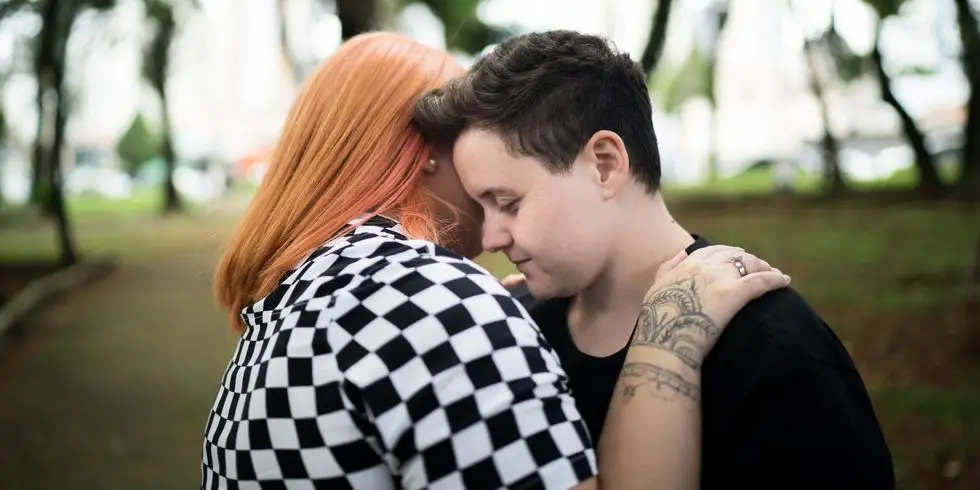With more individuals expressing their unique identities openly, it’s become clear that sexual orientation can be fluid and that questioning or exploring one’s sexuality is a perfectly normal part of the human experience. One term that often arises in discussions about sexual orientation is “bicurious.” But what exactly does it mean to be bicurious? This blog post aims to demystify the concept of bi-curiosity, explore its place in the spectrum of sexuality, and address some common misconceptions. So, let’s dive in and explore!
Contents
Defining Bicurious
 “Bicurious” is a term that has been increasingly used within discussions about sexual orientation. It refers to an individual who, while identifying as heterosexual or homosexual, expresses curiosity about or openness towards engaging in sexual or romantic experiences with individuals of a gender they do not typically find themselves attracted to.
“Bicurious” is a term that has been increasingly used within discussions about sexual orientation. It refers to an individual who, while identifying as heterosexual or homosexual, expresses curiosity about or openness towards engaging in sexual or romantic experiences with individuals of a gender they do not typically find themselves attracted to.
It’s important to note that bi-curiosity is less about a definitive shift in sexual orientation and more about exploration and open-mindedness. Being bicurious does not necessarily mean that a person will definitely engage in a same-sex or opposite-sex relationship or encounter; rather, it implies a curiosity or openness to the possibility.
Some Common Misconceptions About Bicuriosity
As we navigate the complex world of sexual orientations, it’s inevitable that misconceptions arise, often from a lack of understanding or exposure. Here are some common misconceptions related to bicuriosity:
- Bicuriosity is Just a Phase: Many people wrongly believe that being bicurious is merely a transitional phase or a pit stop towards becoming gay or bisexual. However, bicuriosity is not necessarily a phase but could be an enduring aspect of a person’s sexual orientation.
- Bicurious Individuals are Indecisive: This misconception stems from the binary perspective on sexuality, i.e., you can either be straight or gay. Bicuriosity is seen as indecisiveness or confusion. However, bicuriosity is not about confusion, but about exploration and openness to possibilities.
- Bicuriosity Equals Cheating: Some people believe that if you’re in a committed relationship and you identify as bicurious, it means you want to cheat on your partner with someone of another gender. This is not true.
- All Bicurious People Act on Their Curiosity: Another misconception is that all bicurious individuals will eventually engage in a sexual experience with the gender they’re curious about. However, bicuriosity doesn’t guarantee action; it’s about acknowledging the possibility of attraction beyond traditional boundaries.
- Bicuriousity and Bisexuality are the Same: While the two terms may seem similar, they reflect different experiences on the spectrum of sexuality.
Understanding these misconceptions can lead to more enlightened and accepting attitudes towards bicuriosity. It’s essential to respect each person’s self-identified sexual orientation and provide support and understanding to those exploring their sexuality.
Bicurious vs Bisexual
To delve deeper into the nuances of sexual orientation, it’s important to differentiate between the terms ‘bicurious’ and ‘bisexual’. While they might seem similar on the surface, they represent different experiences on the spectrum of sexuality.
Bisexual: A person who identifies as bisexual experiences sexual or romantic attraction to both men and women. This doesn’t necessarily mean the attraction is equally divided; a bisexual individual may have preferences for one gender over another at different times. However, the key distinction is that bisexuality is an established identity, where the individual acknowledges their capacity for attraction to both sexes and identifies with this orientation as part of their core identity.
Bicurious: On the other hand, bi-curiosity is often considered a phase of questioning or exploration. A bicurious person, as discussed earlier, identifies primarily as heterosexual or homosexual but harbors curiosity about or openness towards having experiences with a gender they’re not typically attracted to. Bicuriosity doesn’t guarantee that these individuals will definitively engage in a same-sex or opposite-sex encounter, nor does it automatically lead to identifying as bisexual or any other label on the sexual spectrum. It’s about exploration and understanding one’s feelings and attractions.
Understanding these distinctions can help us respect and validate everyone’s experiences and identities. It’s crucial to remember that every person’s experience with their sexuality is deeply personal and can evolve over time. Both bi-curiosity and bisexuality, like all sexual orientations, deserve respect and understanding.
The Impact of Society Towards Bicuriosity

Society’s perceptions and attitudes can have a significant impact on individuals who identify as bicurious. It’s a harsh reality that misunderstanding and stigma often surround discussions about sexuality that deviate from the traditional heterosexual narrative. Let’s take a closer look at how societal attitudes impact bicuriosity:
- Societal Misconceptions and Stereotypes: Bicuriosity, like many non-heteronormative orientations, is often misunderstood. There are prevalent stereotypes that bicuriosity is merely a phase, an indecisiveness, or a stepping stone to identifying as bisexual or gay. These misconceptions can invalidate the experiences and feelings of those who identify as bicurious, causing distress and confusion.
- Stigmatization: Society’s lack of understanding often leads to the stigmatization of bicuriosity. The fear of judgment or ridicule may hinder individuals from exploring their bicuriosity or openly identifying as bicurious.
- Pressure to Conform: The societal pressure to adhere to conventional labels can limit individuals’ freedom to explore their sexuality. People questioning their sexuality may feel forced to suppress their feelings or quickly pick a label that may not accurately represent their experiences or feelings.
- Bi-Erasure and Biphobia: Bicuriosity can sometimes face erasure or denial, with society often failing to recognize it as a valid sexual orientation. This erasure can be harmful and isolating, making individuals feel invisible or invalidated. Additionally, biphobia, the aversion to bisexuality and by extension bicuriosity, can be a barrier to acceptance and understanding.
It’s crucial to challenge these societal attitudes to create a more accepting and understanding environment. Encouraging open conversations, promoting education around diverse sexual orientations, and challenging stigmas can help society progress towards accepting bicuriosity as a valid part of the spectrum of human sexuality.
Exploring Bicuriosity: Tips and Advice
 For individuals who find themselves identifying with bicuriosity, it can be a time of both excitement and confusion. As you embark on this journey of self-discovery, here are some tips that may help you navigate these uncharted waters:
For individuals who find themselves identifying with bicuriosity, it can be a time of both excitement and confusion. As you embark on this journey of self-discovery, here are some tips that may help you navigate these uncharted waters:
- Acknowledge Your Feelings: Recognize that it’s completely okay to question your sexual orientation. Allow yourself to feel your emotions fully and honestly without judging or dismissing them.
- Take Your Time: Understanding your sexuality doesn’t have to be a rushed process. It’s okay to take your time to explore your feelings and attractions. There’s no deadline or timeline you need to follow.
- Practice Self-Care: Exploring your sexuality can be emotionally taxing. Remember to take care of your mental and emotional health during this period. This might mean practicing mindfulness, speaking to a counselor, or ensuring you have enough time for relaxation and recreation.
- Communicate Openly: If you feel comfortable, consider sharing your thoughts and feelings with someone you trust. They may provide you with comfort, insights, or different perspectives that can help you navigate your feelings.
- Seek Support: There are many support groups, online forums, and resources available for people exploring their sexuality. Connecting with others who are experiencing the same feelings can be comforting and enlightening.
- Consult a Professional: If your feelings are causing distress or confusion, speaking to a mental health professional or a counselor experienced in sexual orientation issues can provide beneficial support and guidance.
Remember, there’s no ‘right’ or ‘wrong’ when it comes to your sexuality. The most important thing is that you remain true to yourself and honor your feelings. It’s your journey—navigate it at a pace that feels right for you.
Tips to Support Individuals with Bicuriosity
 If you’re a friend, family member, or ally, it’s essential to provide support and understanding to individuals exploring their bicuriosity. Here are some tips that can help:
If you’re a friend, family member, or ally, it’s essential to provide support and understanding to individuals exploring their bicuriosity. Here are some tips that can help:
- Respect Their Journey: Remember that everyone’s journey in understanding their sexuality is unique and personal. Give them the time and space they need to explore their feelings without pressure or judgment.
- Encourage Open Conversations: Make it clear that you are open and willing to talk about their experiences and feelings. This can help them feel more comfortable discussing their thoughts and concerns.
- Avoid Labels: Avoid forcing labels on their experiences or pressuring them to define their sexuality in a particular way. Let them choose the terms that best describe their feelings.
- Be Informed: Take the time to educate yourself about different sexual orientations and the spectrum of sexuality. This can help you better understand and support their exploration.
- Challenge Stereotypes: Stand up against stereotypes and misconceptions about bicuriosity. This can help create a more accepting environment for them to explore their feelings.
- Provide Resources: Point them to resources that can help them better understand their feelings. This could be books, online resources, support groups, or professional counseling services.
- Show Unconditional Support: Perhaps the most important tip is to show unconditional support and reassurance. Let them know that you value them for who they are and that their exploration of their sexuality does not change your relationship with them.
By offering your understanding, patience, and support, you can make a significant difference in the journey of someone exploring their bicuriosity. They need to know they’re not alone and that their feelings are valid and understood.
Conclusion
The journey to understanding and embracing our sexual identities can be intricate and intensely personal. Bicuriosity, like all forms of sexuality, is a legitimate and significant part of this spectrum.
Remember, every individual’s experience is unique, and there’s no standard pathway or timeline to explore one’s sexuality. For those of you exploring your bicuriosity, trust your journey and know that it’s okay to seek help, talk about your feelings.
We know life may sometimes be challenging for bisexuals, but Online Bisexual Counseling can help. Get experienced LGBTQ therapists at PrideMantra: Book a trial LGBTQ therapy session.


